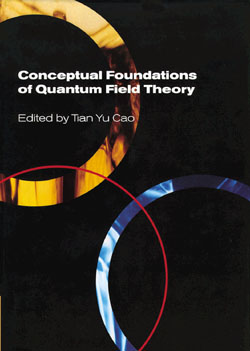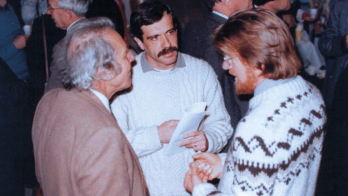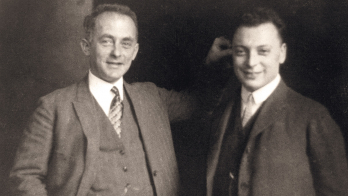edited by Tian Yu Cao, Cambridge University Press 0 521 63152 1 (hbk £60/$100).

Tian Yu Cao’s book Conceptual Developments of 20th Century Field Theories, published in 1997, was hailed in many quarters as a masterpiece. The same careful thinking is evident in this book, the result of a conference held at Boston University in 1996.
Boston (particularly Harvard) has long been a cradle of field theory, even during the dark years when the subject was not fashionable, and many key figures attended the event. The idea was for leading field theorists, philosophers and historians to present their insights and views. Participants included Sidney Coleman, David Gross, Sheldon Glashow, Steven Weinberg and Arthur Wightman.
All of these figures also participated in a lively concluding round-table discussion that was moderated by Stanley Deser. The following extract from this discussion underlines the scholarship and entertainment that the meeting provided.
Gross: Actually, I wanted to answer [the] question about what question I would ask God…There are two answers…The first is a kind of joke. I’d paraphrase Gertrude Stein and ask “What’s the question?’, because in some sense that’s really the hardest thing in physics: to ask the right question. In explaining to me the question, He would have to explain all the answers I would like to know.
Deser: He’s subtle. We don’t know what He would say.
Gross: The other question is one that from the point of view of particle physics seems to be the most mysterious…that is, “Why is the cosmological constant zero or so small?”
Weinberg: I think we all always keep raising the same question, which is why things are the way they are.
Deser: Sure, but there are some things which are more “the way they are” than others. And it’s not clear to me why the cosmological constant is picked on specifically as being
Weinberg: It’s a lot of orders of magnitude.
Deser: No, I understand that.
Coleman: 120 orders of magnitude between the rough order of magnitude and the experimental observation.
Deser: That should tell you that it can’t be the fundamental problem. But anyway, that would take longer to discuss. Shelly, what would you like to ask God, or do you know all the answers?
Glashow: I’m working at that…One question: “Why is the top quark so heavy?”
Deser: That’s a good question. You don’t care about the tau lepton?
Weinberg: Yeah, I would have said, you know, that’s the easy one, because that’s the mass you would expect.
Coleman: Why are the others so light?
Gross: Why is the neutrino so light?
Glashow: Yeah, well, you start off with the easy questions, see.
Weinberg: Why is the electron so light? That’s really hard. I mean, the electron is the mysterious particle, not the top quark.
Deser: Anyway, why is this difference of emphasis important?
Weinberg: Well, it does direct the way you think. I mean, some people think you have to give the top quark new kinds of interactions which are different from the other particles. And other people think you have to invent new symmetries that keep the light quarks light. I’m not sure, obviously, which is right, but there is a difference.
Glashow: Steve, we’re asking the same question: “Why is there this little, curious factor of 105 between the mass of the lightest particle and the mass of the heavier particle?”
Weinberg: Yeah, that’s the right one to ask. And it really is an amazing thing.
Deser: And you have no leptonic questions?
Weinberg: Same question.







